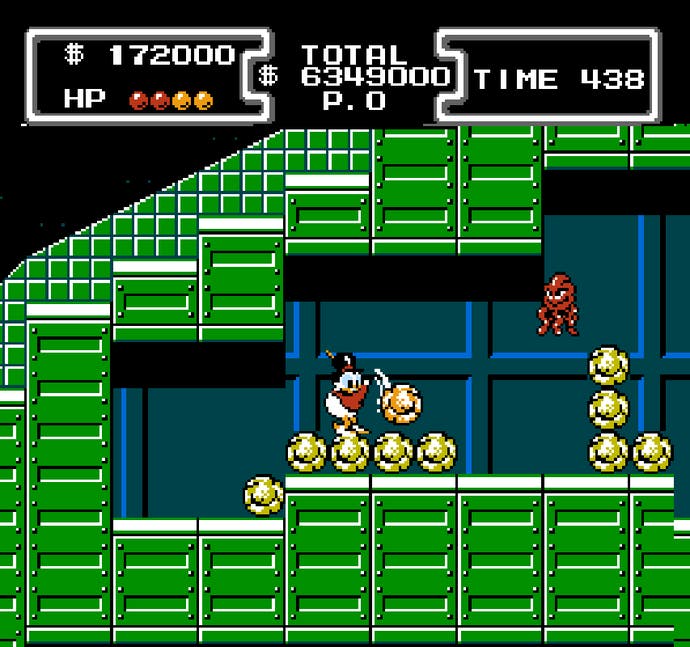Retrospective: DuckTales
Tales of derring-do.
All that glorious hopping and careering is the most immediate charm of DuckTales. The more gradual pleasure comes from exploring the game's twisting landscapes. Given the memory constraints of a 1990 NES cart, the five stages on offer are modest little worlds. To a new player, though, they feel vast, because the level designers use a crafty psychological trick: the illusion of choice.
DuckTales' levels aren't laid out in standard left-to-right fashion. They branch out, double back on themselves, use vertical space. Players often come to a juncture where they can choose between two routes - up or left, say. Both directions will continue on for a while, and they might both be valid ways of reaching the boss. You can only choose one at a time, though. There could be anything on the path not taken. And in our brains, that unknown "anything" feels huge, a reality that wasn't lost on the clever folks at Capcom.
Over a couple completions of DuckTales - which doesn't take long, as the game isn't especially challenging - you explore all the side routes and catalogue the vast unknown. You undo the deception that made DuckTales appear much bigger than it was. The upshot is that the world coalesces from a confusing sprawl to something more manageable.

When we talk about "completionists" in modern games, we're typically talking about obsessives like the Assassin Creed II feather collectors. DuckTales springs from a time when completionism wasn't such a chore. With a bit of work you can memorise all the maps of the game and commit the whole playthrough to muscle memory - in other words, get it in your brain and get it in your hands. That intimate, thorough knowledge of the game is possible because DuckTales is simple, yet it's gratifying because DuckTales seems complex.
I'd be remiss not to mention that the soundtrack, composed by Capcom mainstay Yoshihiro Sakaguchi, is among the NES' best. In particular, the extraordinary theme for the Moon stage somehow creates a grand sense of odyssey from the system's boops and bleeps. Do a search on YouTube and you'll find not only the original, iconic chiptune but also a slew of worthwhile remixes.
Thanks to the briar patch of intellectual-property contract law that surrounds a licensed game like this, you shouldn't expect to see DuckTales on Virtual Console anytime soon. That's the distressing downside of the 8-bit renaissance - the legacy of the medium is being shaped on the basis of commercial expediency, and inevitably, important titles get left behind.
If you want to play DuckTales today and don't own the original cartridge, you'll have to try your luck on the used market or otherwise track down a copy. (Use your imagination!) It's one of those cases where the fan community has to fill in the blanks created by corporate inertia, as this winningly weird platformer deserves to be remembered. What to do? Just grab onto some DuckTales.
